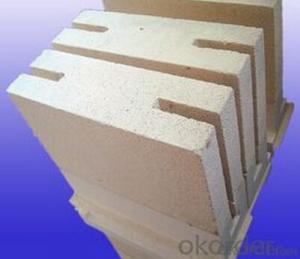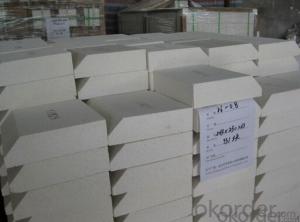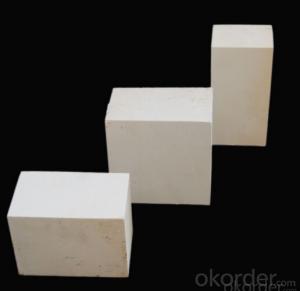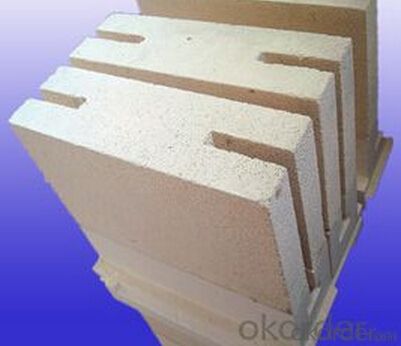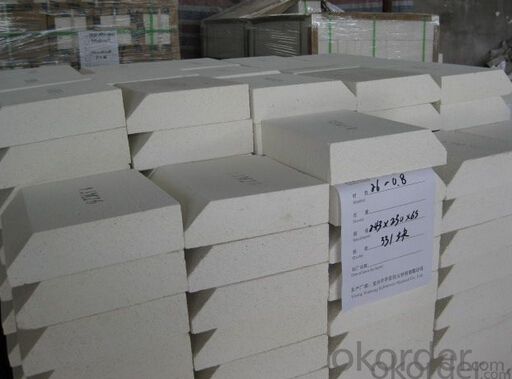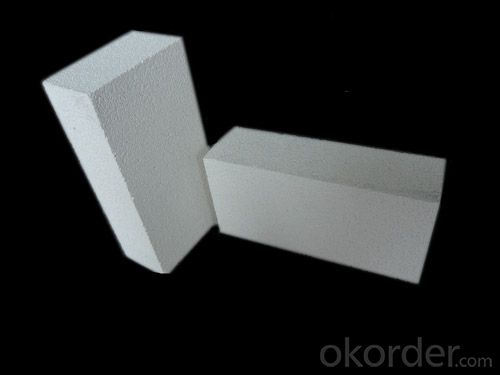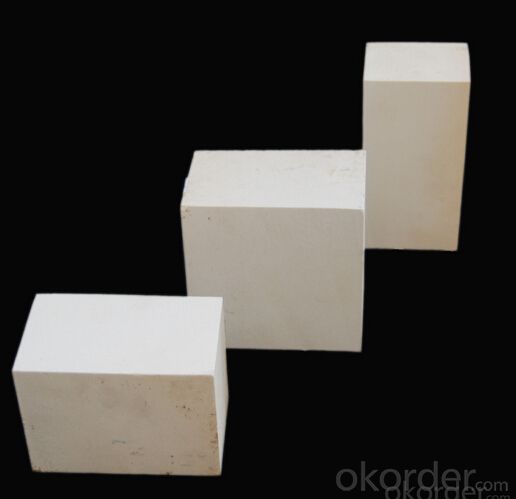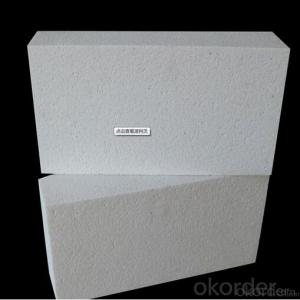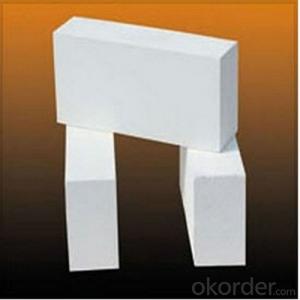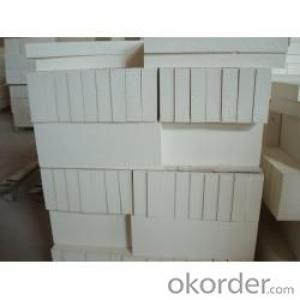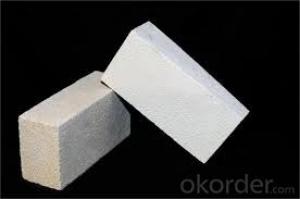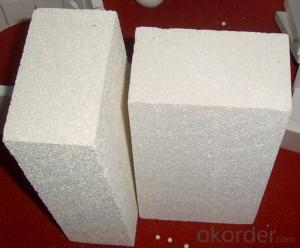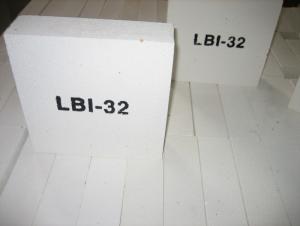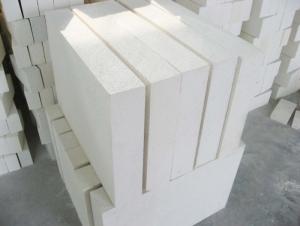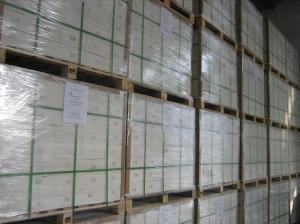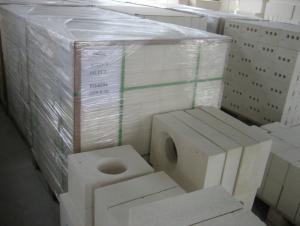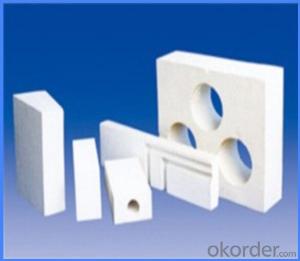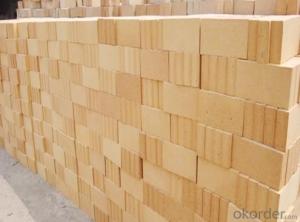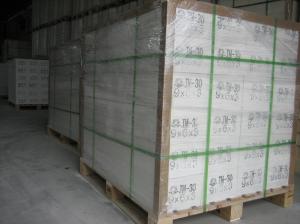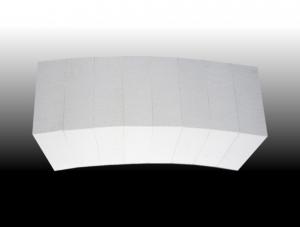Insulating Fire Brick - Refractory Mullite Insulating Fire Brick GJM 30
- Loading Port:
- Shanghai
- Payment Terms:
- TT OR LC
- Min Order Qty:
- 5000 kg
- Supply Capability:
- 100000 kg/month
OKorder Service Pledge
OKorder Financial Service
You Might Also Like
Top insulation ceramic fiber blanket
General information of ceramic fiber blanket
Cmax ceramic fiber blanket is made of high quality kaolin clay, centrifugal high purity alumina and silica or blowing process. It's no asbestos. Double side acupuncture for easy installation provides a lot of tension or strength of the blanket.
Products are divided into standard, high pressure, HA and Hz, respectively, corresponding to the highest service temperature of 1000, 1100, 1200, and 1350
Characteristics of ceramic fiber blanket
Heat resistance
Light weight
Low thermal conductivity
Low heat storage
Thermal shock toughness
High tensile strength
Application of ceramic fiber blanket
Refractory fiber lining for petrochemical process heating furnace
Heat treatment furnace or intermittent (shuttle) kiln heat surface lining
General oven standby insulation
Heat sealing or kiln kiln car door
Electrical insulation
Ceramic fiber blanket
Common problem solutions
1. What products do you have?
We have all kinds of refractory bricks, refractory casting materials, mortar, cement, ceramic fiber products, etc..
Or you can browse our products to choose what you need.
2. How to control product quality?
With strict quality control system throughout the material selection and production process, we have the quality of refractory materials and ceramic fiber products to meet customer requirements.
From the selection of raw materials, the quality of our control to start. The quality certificate of the raw material is required, each batch of the products are to be tested in the use of the forward line. In the production process, the quality control by the workers, and then each piece of classification, and through the quality supervision and inspection.
3. Can you give me a brief introduction to the application of your product?
My company is mainly engaged in refractories in the steel, cement, glass, ceramics, petrochemical, electric power and other industries.
4. What information do you need if I need you?
In order to select the right products, we will provide us with information, such as the United States, technical data, order quantity, product application, etc..
If you have any questions, please contact us.
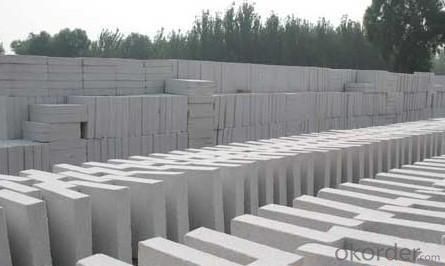
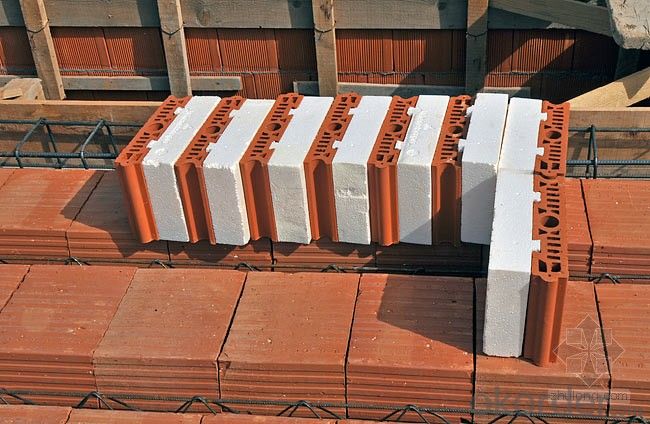
FAQ
1. Which products do you have?
We have all kinds of refractory brick, castable, mortar, cement, ceramic fiber products, etc.
Or you could browse our products to choose what you need.
2. How do you control the products quality?
With strict quality control system throughout the materials selection and production process, our refractory and ceramic fiber products quality is effectively controlled to meet customer requirements.
From the raw materials selecting, our quality control begin. The quality certificates of raw materials are required and each batch will be tested before using. During production, the quality control are conducted by workers and then each piece will be sorted and examined by quality supervise.
3. Can you give me a brief introduction of the application of your products?
We are mainly specializing in the refractory materials in iron and steel, cement, glass, ceramics, petrochemical, electric power Industry, etc.
4. If I need your offer, what information do you need?
In order to choose suitable products, it will be appreciated to provide us the information, such us specification, technical data, order quantity, products application etc.
If any question, please contact us freely.
- Q: Can insulating fire bricks be used in chimney lining?
- Yes, insulating fire bricks can be used in chimney lining. Insulating fire bricks are designed to withstand high temperatures and provide excellent insulation, making them suitable for lining chimneys. They help to retain heat within the chimney, preventing it from escaping through the walls and improving the efficiency of the fireplace or stove. Additionally, these bricks are lightweight and easy to install, making them a popular choice for chimney lining projects. However, it is important to ensure that the specific type of insulating fire brick being used is suitable for chimney applications and complies with local building codes and regulations.
- Q: Can insulating fire bricks be used in residential fireplaces?
- Yes, insulating fire bricks can be used in residential fireplaces. Insulating fire bricks are designed to withstand high temperatures and provide excellent insulation, making them a suitable choice for fireplace construction. These bricks can help retain heat, increase energy efficiency, and prevent heat loss. They also offer superior protection against thermal shock, which is essential for withstanding the intense heat generated by a fireplace. Additionally, insulating fire bricks are lightweight, easy to handle, and can be easily shaped or cut to fit any fireplace design or size. Overall, using insulating fire bricks in residential fireplaces is a wise choice for homeowners looking to enhance the performance and safety of their fireplace.
- Q: Are insulating fire bricks resistant to acid or alkali attacks?
- Insulating fire bricks are generally resistant to acid attacks but may not be highly resistant to alkali attacks.
- Q: Can insulating fire bricks be used as a lining for incinerators?
- Yes, insulating fire bricks can be used as a lining for incinerators. Insulating fire bricks have excellent thermal insulation properties, which help to reduce heat loss, increase energy efficiency, and maintain high temperatures within the incinerator. Additionally, they can withstand high temperatures and provide good resistance to thermal shock and chemical erosion, making them suitable for lining the walls, floors, and roofs of incinerator chambers.
- Q: Can insulating fire bricks be used for insulation in chemical reactors?
- Yes, insulating fire bricks can be used for insulation in chemical reactors. Insulating fire bricks are made from lightweight materials such as vermiculite or perlite, which have excellent thermal insulation properties. These bricks are designed to withstand high temperatures and can provide insulation in a variety of applications, including chemical reactors. Chemical reactors often operate at elevated temperatures, and maintaining a stable temperature is crucial for efficient and safe operation. By using insulating fire bricks as insulation in chemical reactors, heat loss can be minimized, leading to better energy efficiency and cost savings. Additionally, insulating fire bricks can help to reduce the temperature gradient within the reactor, ensuring uniform heat distribution and enhancing the overall performance of the reactor. Furthermore, insulating fire bricks are resistant to chemical attack and can withstand the corrosive effects of various chemicals used in chemical reactions. This makes them suitable for use in chemical reactors where exposure to corrosive substances is common. In summary, insulating fire bricks are an excellent choice for insulation in chemical reactors. They provide superior thermal insulation, can withstand high temperatures, and are resistant to chemical attack. Using insulating fire bricks in chemical reactors can contribute to improved energy efficiency, temperature stability, and overall performance of the reactor.
- Q: Are insulating fire bricks resistant to high-velocity gases?
- Yes, insulating fire bricks are generally resistant to high-velocity gases. Insulating fire bricks are designed to have high thermal resistance and low thermal conductivity, which makes them ideal for applications where they are exposed to high temperatures and gases. They are able to withstand the impact and velocity of gases without getting damaged or compromised. Insulating fire bricks are commonly used in industrial furnaces, kilns, and other high-temperature environments where they need to provide insulation and protection against high-velocity gases.
- Q: What is the typical moisture content of an insulating fire brick?
- The typical moisture content of an insulating fire brick can vary depending on several factors such as the specific composition of the brick, the manufacturing process, and the storage conditions. However, in general, insulating fire bricks are designed to have a low moisture content to enhance their insulating properties and resistance to thermal shock. Typically, insulating fire bricks have a moisture content ranging from 0.5% to 2%. This low moisture content helps to prevent the bricks from cracking or spalling when exposed to high temperatures. It also minimizes the risk of moisture-related damage, such as freeze-thaw cycles or the release of steam when heated. To ensure the optimal performance and longevity of insulating fire bricks, it is recommended to store them in a dry environment and protect them from moisture during transportation and installation.
- Q: Can insulating fire bricks be used in chemical processing plants?
- Indeed, chemical processing plants can utilize insulating fire bricks. These bricks are specifically engineered to endure elevated temperatures and offer exceptional thermal insulation. Consequently, they are suitable for a wide range of industrial applications, including chemical processing plants. They can be employed to line furnaces, kilns, reactors, and other apparatuses where high temperatures are involved. The exceptional thermal insulation properties of insulating fire bricks aid in reducing heat loss, enhancing energy efficiency, and maintaining a steady temperature within the processing equipment. Furthermore, these bricks exhibit resistance to chemical corrosion and can withstand the rigorous conditions typically encountered in chemical processing plants. Ultimately, insulating fire bricks serve as a dependable and efficient choice for insulating and safeguarding equipment in chemical processing plants.
- Q: Can insulating fire bricks be used in the construction of glass melting tanks?
- Yes, insulating fire bricks can be used in the construction of glass melting tanks. These bricks are designed to withstand high temperatures and provide excellent thermal insulation, making them suitable for applications such as glass melting tanks where maintaining consistent and controlled heat is crucial.
- Q: Are insulating fire bricks suitable for use in wood-fired ovens?
- Yes, insulating fire bricks are suitable for use in wood-fired ovens. These bricks are specifically designed to withstand high temperatures, making them ideal for use in ovens or other heat-intensive applications. Insulating fire bricks have excellent thermal insulation properties, which helps to retain heat inside the oven and ensures a more efficient cooking process. Additionally, these bricks have a low thermal conductivity, meaning they transfer less heat to the external surfaces, resulting in a safer and more comfortable cooking experience. Therefore, using insulating fire bricks in wood-fired ovens can provide better heat retention, energy efficiency, and improved overall performance.
Send your message to us
Insulating Fire Brick - Refractory Mullite Insulating Fire Brick GJM 30
- Loading Port:
- Shanghai
- Payment Terms:
- TT OR LC
- Min Order Qty:
- 5000 kg
- Supply Capability:
- 100000 kg/month
OKorder Service Pledge
OKorder Financial Service
Similar products
Hot products
Hot Searches
Related keywords
